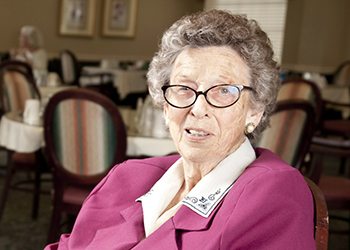
The issue
BC Statistics estimates that by 2021, roughly 18% of the BC population will be 65 years and over. As more British Columbians reach an age that warrants special assistance from the community, policy makers need evidence to help them best provide that support.
For some of BC’s seniors, living alone at home is not viable due to safety concerns. They may need more personal assistance than home-based health services can provide, but they may still not require the intensity of nursing home services. For these seniors, Assisted Living (AL) can be a middle ground between living independently and living in residential care.
Led by Kimberlyn McGrail, researchers at UBC’s Centre for Health Services and Policy Research (CHSPR), worked closely with the Home and Community Care and Performance Accountability Branch at the BC Ministry of Health and the Provincial Home and Community Care Council to report on BC’s publicly-funded assisted living residences.
Data sources linked
- Medical Services Plan (BC Ministry of Health)
- Medical Services Plan Registration & Premium Billing (BC Ministry of Health)
- Hospital Separations (BC Ministry of Health)
- Deaths (BC Vital Statistics Agency)
- Home and Community Care (BC Ministry of Health)
- PharmaCare (BC Ministry of Health)
What did we learn?
Half of AL residents are 85 years and older, and three quarters are women.
- About half of people who move to AL subsequently move on to residential care.
- More than a quarter of residents leave in less than one year.
- Dementia diagnoses increase substantially in the first year after moving to AL. This diagnosis is associated with a shorter length of stay.
- Residents use less healthcare services in the first year after moving into AL.
- Polypharmacy, or the use of multiple medications decreases slightly.
- AL residents show a high use of benzodiazapenes and atypical antipsychotics.
- Only one third of people who die, do so in AL.
This group of about 3,000 seniors were in the hospital 30,000 fewer days in the year after moving to Assisted Living compared to the year prior.
If the average cost of acute care is $1,000 per day, this is a cost avoidance of about 30 million dollars.
"This study was only possible because we were able to link information across different health care sectors and over time. The ability to link data allowed us to ask questions about individuals’ experiences before and after admission to Assisted Living."
Kimberlyn McGrail, Associate Director, UBC Centre for Health Services and Policy Research
Making a difference
Authorities will use the results of this study as they continue to build and modify publicly funded services that support a fast-growing elderly population.
Future research will look at finding models of care better suited to those with dementia, pharmaceutical use among those in AL, and the causes for hospitalization after AL to improve safety and timely services.
To expand our understanding of how different genders use AL residences, studies will also examine whether men and women leave AL for the same reasons, and if they go to the same or different destinations.
